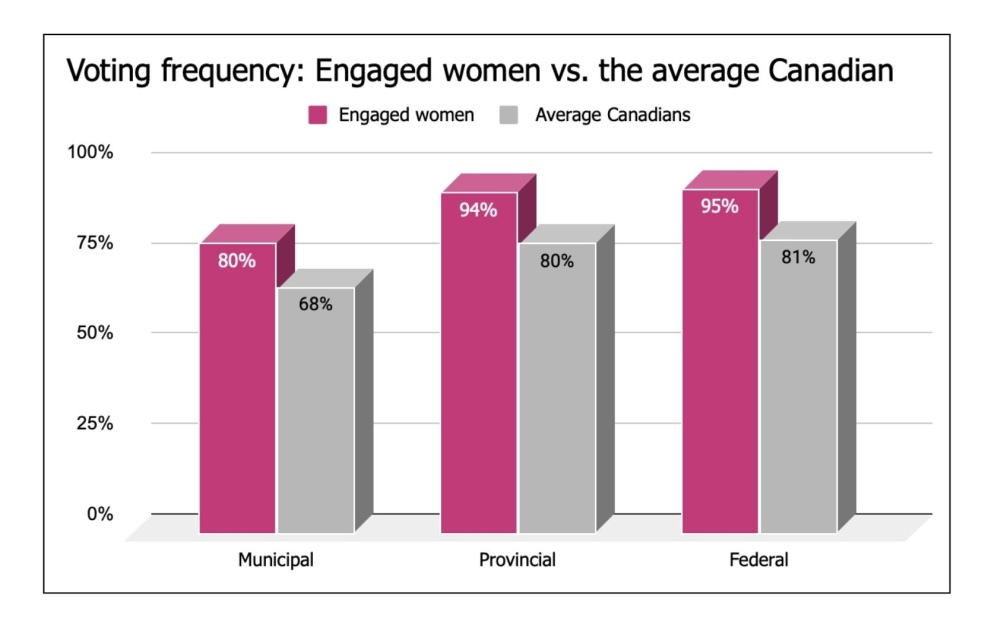As the political and economic landscape in Canada and the U.S. changes daily, engaged women have made it clear what policies will be important to them during upcoming elections. The degree to which party platforms align with these policy priorities will influence their voting decisions.
Canada Powered by Women’s third national omnibus survey, completed in January 2025, reveals the number of engaged women has once again increased, they know their top policy priorities and Canadian leaders can expect to see nearly 100 per cent of them — a much higher turnout than the number of average Canadians — at the polls in upcoming elections.
The number of engaged women continues to grow
Our annual omnibus survey shows the growth of our audience, which is defined as ‘engaged women’, increasing again from 34.5 per cent in 2024 to 42 per cent today, now representing and astounding number of women (6.7 million) across the country (21 per cent of Canadians).
An engaged woman is someone who takes in the news, is informed on politics, understands the connection between the economy and energy and wants a voice in the energy conversation. These women are interested in learning more about how they can support dialogue about issues facing Canadians, including economic prosperity and energy. They are present in all provinces across Canada in proportion with the national population.
Policy priorities for families and personal well-being
Our spring 2024 omnibus reported that engaged women’s top three priorities were economic prosperity, energy security (reliability and affordability) and the environment.
In the midst of political upheaval and impending elections, the 2025 omnibus asked about what policy priorities would influence engaged women’s voting decisions. What we saw was a bit surprising, as policy priorities indicate a shift in priorities overall.
According to our research from this January, these are engaged women’s top policy priorities:
This data indicates engaged women are prioritizing issues more closely tied to their personal well-being, prosperity and security on many levels.
Engaged women, a powerful voting force
Ontario is heading to the polls on February 27, 2025, and the next federal election — while officially scheduled for October 2025 — could take place as early as May. As tariff threats from the U.S. continue to loom and the future of affordability, prosperity and personal well-being for Canadians remains uncertain, there will be a lot at stake in upcoming elections.
Our research shows that engaged women are more likely than Canadians on average to vote in elections at all levels of government:

*Percentages indicate the selection of ‘every’/‘most elections’
If a federal election were held today, 97 per cent of engaged women are likely to vote, compared to 87 per cent of Canadians. Both percentages are high, indicating Canadians and women want elections.
What’s next?
Canada Powered by Women’s next national survey will be in market in about four to six weeks to explore the connection engaged women make between a strong Canada with a thriving economy fueled by a robust and growing energy sector.
Key findings will be presented at our national events tour — Powering prosperity: Shaping a sustainable energy future — which includes Canada Powered by Women’s first-ever Summit in Toronto on April 29, 2025, and signature events in Vancouver (May 6, 2025) and Calgary (May 9, 2025).
During these events, we will continue to facilitate this important national conversation and host an interactive workshop designed to collect actionable insights from engaged women, which will be distilled into a national report for policymakers to refer to when making fundamental decisions about the future of Canada’s economy, energy, resources and more.
Tickets and details will be released on our channels in the coming days. To stay in the loop with updates on our research and upcoming events, be sure to join our community.
Survey methodology
The survey data is from Leger’s Omnibus Study, conducted from January 17 – January 19, 2025, among 1,578 Canadians, randomly recruited from LEO’s online panel.
